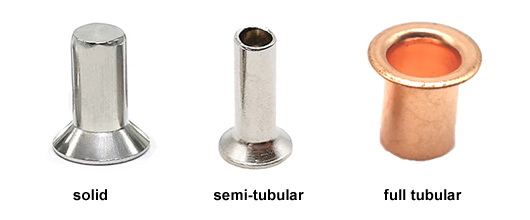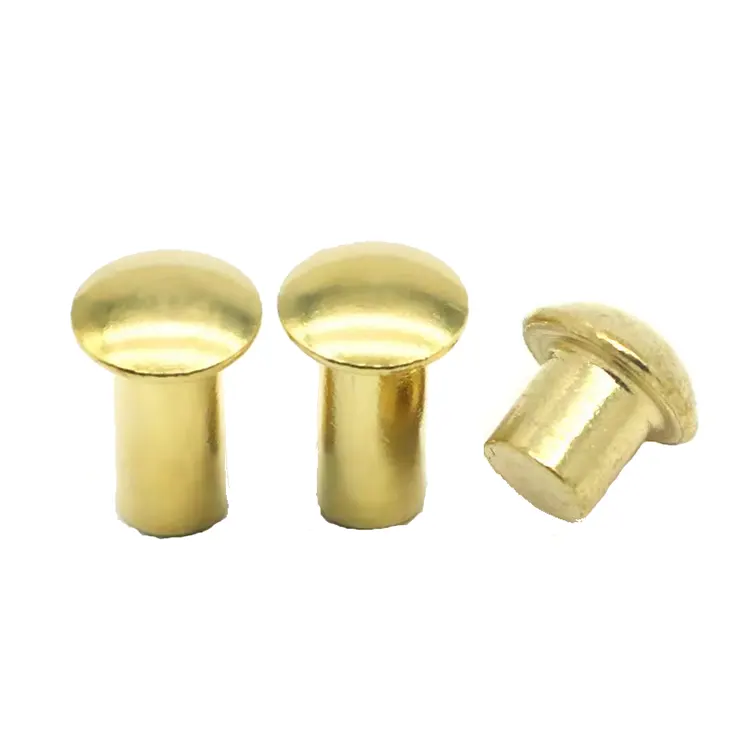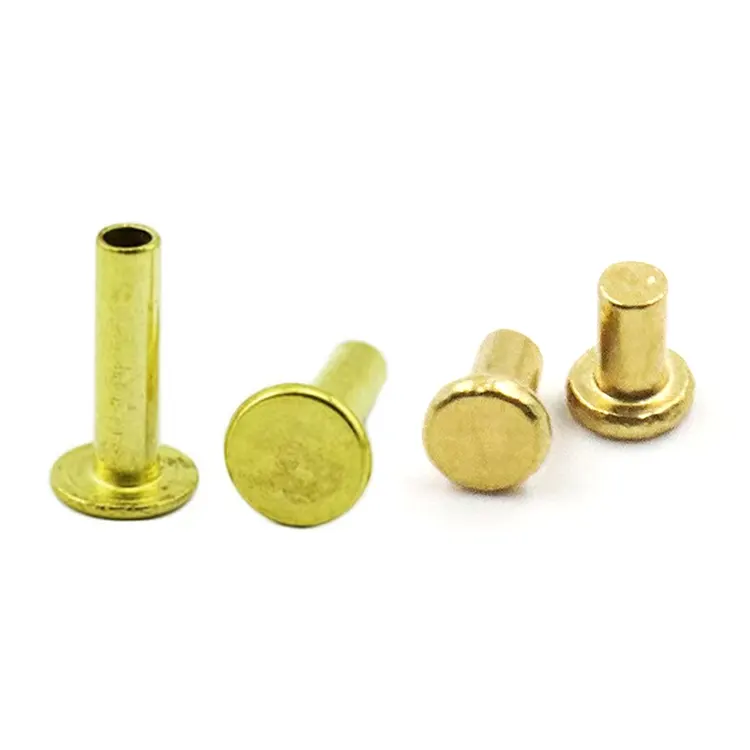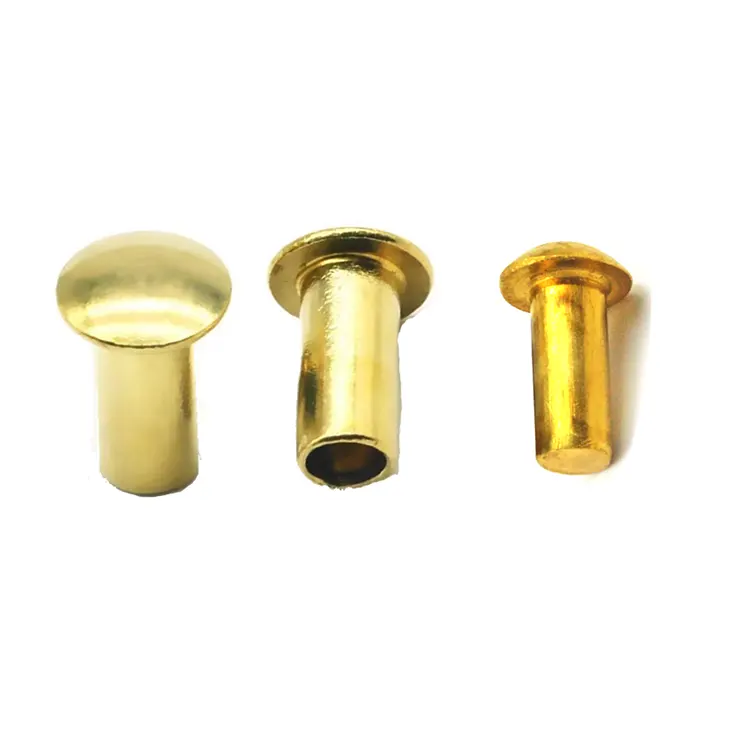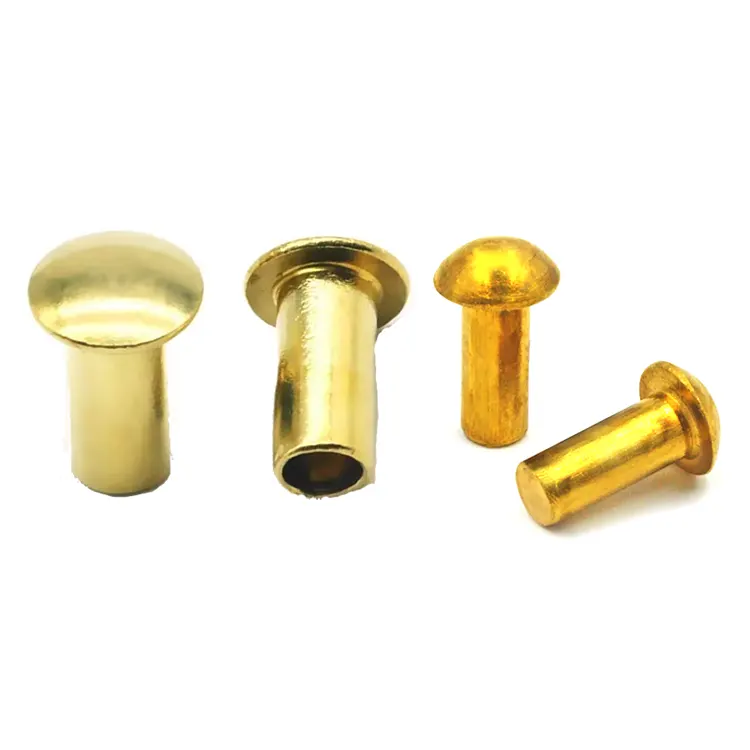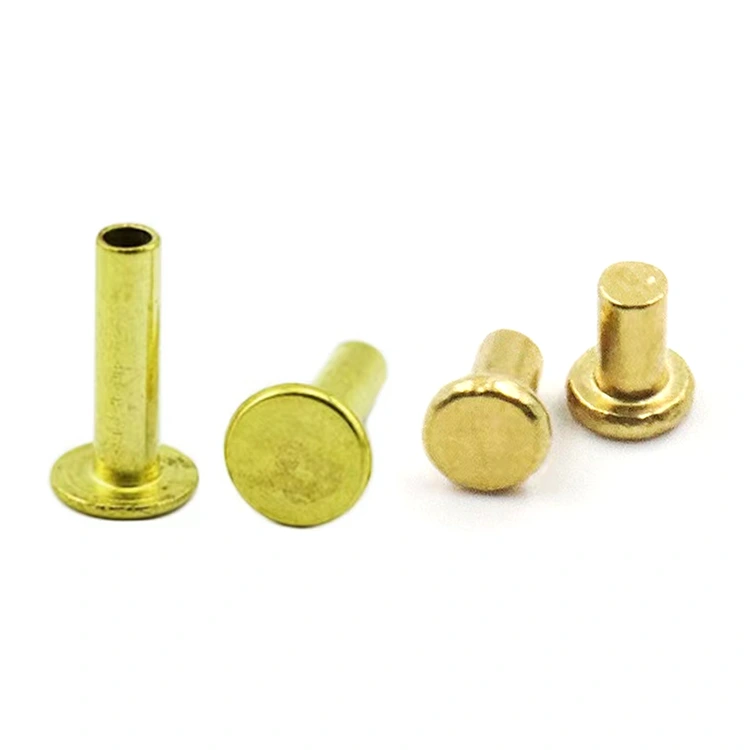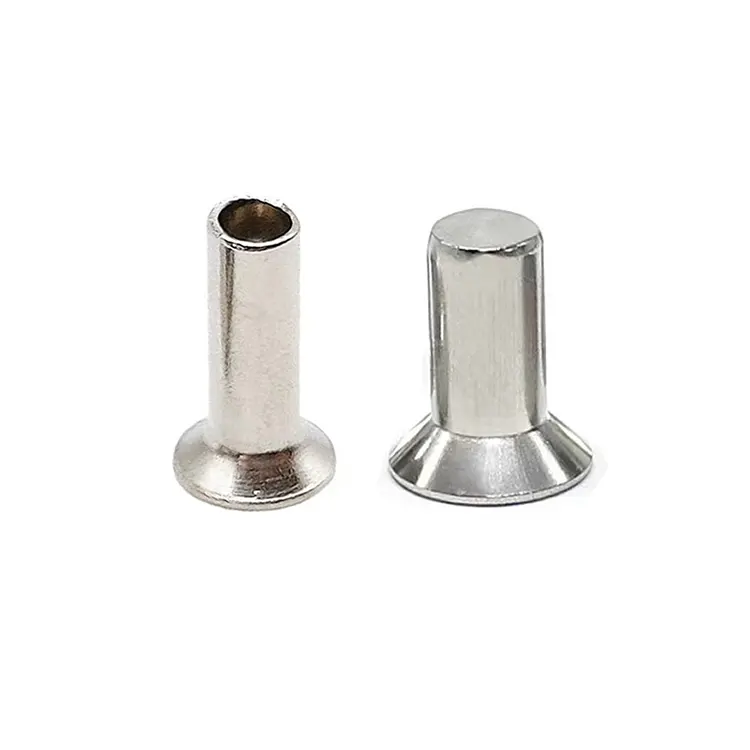리벳
As one of professional manufacturer in China, Notin would like to provide you Rivets. And we will offer you the best after-sale service and timely delivery.
What is a rivet?
A rivet is a permanent mechanical fastener used to join two or more materials. Rivets work by inserting a metal pin into an aligned hole and deforming the end, creating a strong, secure, and durable connection. Unlike temporary fasteners like screws, rivets do not rely on threads, but instead form a permanent connection, making them ideal for applications requiring high strength, durability, and vibration resistance.
Classification of Rivets
Rivets are typically categorized by head shape, degree of hollowness, or material.
Based on head shape, rivets can be classified as flat head rivets, round head rivets, countersunk head rivets, mushroom head rivets, universal head rivets, truss head rivets, etc.

Based on degree of hollowness, rivets can be classified as solid rivets, semi-tubular rivets, or full tubular rivets.
Based on material, rivets can be classified as brass rivets, stainless steel rivets, steel rivets, aluminum rivets, copper rivets, etc.
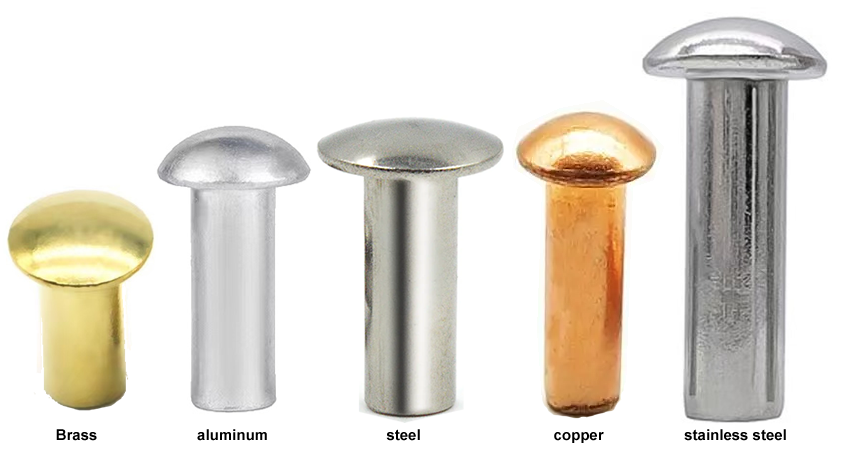
What surface finishes are available for rivets?
Rivet surfaces are typically treated with rust-proofing treatments, primarily electroplating, including zinc plating, nickel plating, chrome plating, tin plating, gold plating, and silver plating. Electroplating is a common rust-proofing method for rivets. It applies a layer of plating to the rivet surface through physical or chemical methods. The plating effectively prevents corrosion and rust, while also providing a certain aesthetic effect.
Another special surface treatment method is head coating. Head coating is performed after the rivet is electroplated. This allows for a variety of colors on the rivet head, achieving an aesthetically pleasing finish.
Aluminum rivets cannot be electroplated, but they can be anodized. Anodizing also allows for a variety of color options, but the unit price is higher than electroplating.
Rust-proofing the rivet surface is crucial, effectively extending the rivet's service life and ensuring a secure connection. Different rust-proofing methods are suitable for different environments and applications, so the choice should be tailored to the specific situation.
- View as
황동 둥근 머리 리벳
Nuote Metals는 황동 둥근 머리 리벳의 생산 및 판매를 전문으로 합니다. 우리는 산업 발전이 활발한 도시인 중국 동관에 위치하고 있습니다. 당사의 구리 세미 불기 헤드 리벳은 황동 합금으로 제작된 생크와 캡으로 구성됩니다. 세미볼기(Semi-bulgy) 헤드 디자인은 균일한 압력 분포를 제공하여 관절 표면의 손상을 방지합니다. 이 제품은 결합된 전기 전도성과 내식성, 간단한 구조, 쉬운 설치, 높은 신뢰성 및 긴 서비스 수명이 특징입니다.
더 읽어보기문의 보내기황동 리벳
Nuote Metals는 중국에서 황동 리벳을 생산하며, 황동 리벳은 주로 다양한 장점을 제공하는 구리 및 아연 합금으로 만들어집니다. 황동은 내식성이 뛰어나 녹슬지 않고 습한 환경에서 장기간 사용에도 견딜 수 있어 옥외 사용이나 습도가 높은 환경에 적합합니다. 황동은 또한 강도와 경도를 갖고 있어 우수한 인성을 유지하고 파손에 저항하면서 기계적 응력을 견딜 수 있습니다. 또한 황동은 전기 전도성과 열 전도성이 뛰어나 전자 및 열 장비에 사용하기에 적합합니다. 황동은 표면이 매끄러워 전기도금이나 연마가 용이하여 미관이 향상됩니다. 이러한 특성으로 인해 황동 리벳은 여러 산업 분야에서 선호됩니다.
더 읽어보기문의 보내기황동 팬 헤드 리벳
Nuote Metals는 황동 팬 헤드 리벳 생산을 전문으로 합니다. 당사의 리벳은 황동 함량이 높고 부드럽고 성형이 용이하며 리벳팅 공정 중에 균열이 발생할 가능성이 적은 H65 황동으로 제작됩니다. 황동 팬 헤드 리벳은 헤드와 자루로 구성되며 자루는 길이의 약 절반 정도가 비어 있습니다. 설치하는 동안 리벳은 미리 뚫린 구멍에 삽입됩니다. 특수 리벳팅 기계와 펀치를 사용하여 생크 끝이 확장되어 반대쪽 헤드를 형성하여 클램핑 연결을 만듭니다. 이 공정은 금속의 소성 변형에 의존하므로 용접이나 접착제가 필요하지 않아 간단하고 효율적입니다.
더 읽어보기문의 보내기황동 버섯 머리 리벳
황동 버섯 머리 리벳은 머리와 몸체로 구성됩니다. 머리는 둥글고 약간 편평하며 버섯뚜껑과 비슷합니다. 몸체는 반중공형으로 중앙에 구멍이 있지만 완전히 관통하지는 않습니다. 이것을 황동 반중공 버섯머리 리벳이라고 합니다. 일부 리벳은 황동 솔리드 머쉬룸 헤드 리벳이라고 불리는 솔리드 바디를 가지고 있습니다. 설치하는 동안 특수 도구를 사용하여 미리 뚫은 구멍에 본체를 삽입합니다. 몸체를 변형시키기 위해 압력이 가해지면 몸체가 팽창하고 재료를 붙잡아 안전하게 연결됩니다. Nuote Metals는 이러한 황동 버섯 머리 리벳 생산을 전문으로 합니다.
더 읽어보기문의 보내기황동 플랫 헤드 리벳
황동 플랫 헤드 리벳은 한쪽 끝에 캡이 있는 금속 막대입니다. 이는 변형이나 억지끼움을 통해 리벳팅을 달성하며 일반적인 패스너입니다. 플랫 헤드 설계로 표면 돌출이 줄어들어 높은 평탄도가 요구되는 용도에 적합합니다. 황동의 내식성은 습하고 부식되는 환경에서도 연결 안정성을 보장합니다. Nuote Metals는 황동 플랫 헤드 리벳 생산을 전문으로 합니다. 우리는 수천 개의 금형을 보유하고 있으며 다양한 리벳 사양을 생산할 수 있습니다. 우리는 또한 맞춤형 디자인과 샘플을 지원합니다.
더 읽어보기문의 보내기황동 접시 머리 리벳
황동 접시 머리 리벳은 주로 머리와 생크로 구성됩니다. 카운터성크 헤드를 사용하면 작업물 표면과 같은 높이로 설치할 수 있어 외관이나 기능에 영향을 줄 수 있는 돌출부가 제거됩니다. 반중공 생크는 리벳팅 공정 중에 변형되어 연결됩니다. 이러한 설계는 설치 효율성을 향상시킬 뿐만 아니라 연결 신뢰성도 향상시킵니다. Nuote Metals는 높은 정밀도와 매끄럽고 긁힘 없는 표면을 자랑하는 황동 접시 머리 리벳 제조를 전문으로 합니다. 우리는 전 세계의 친구들이 우리 회사를 방문하고 우리와 협력하는 것을 환영합니다.
더 읽어보기문의 보내기What are the advantages of rivets over other fasteners?
1. Ease of Installation
Rivets are fast to install, and even fully automated for high-volume applications, resulting in a simple and efficient operation process.
2. Connection Reliability
The riveting process is standardized, with strict quality control, resulting in highly stable connections. Visual inspection allows for quick verification of connection quality.
3. Vibration and Impact Resistance
Rivets connect through deformation or interference fit, providing strong clamping force and excellent vibration resistance, capable of withstanding vibration and shock.
4. Low Cost
Rivets are easy to install and can be fully automated, saving significant labor costs.
What are the advantages and disadvantages of rivets made of different materials?
Aluminum Rivets
Advantages: Lightweight, reduces overall product weight, low cost, suitable for general civilian applications.
Disadvantages: Low tensile and shear strength, unsuitable for high-strength workpieces, prone to electrochemical corrosion when in contact with metals such as stainless steel.
Stainless Steel Rivets
Advantages: Strong corrosion resistance, high hardness, suitable for high-strength workpieces (such as marine equipment)
Disadvantages: Higher cost, typically more expensive than aluminum rivets of the same specification.
Brass and Copper Rivets
Advantages: Excellent conductivity (such as connecting electronic components), good corrosion resistance.
Disadvantages: Higher cost, more difficult to process.
Steel Rivets
Advantages: High hardness, high connection reliability, and wide applicability.
Disadvantages: Compared to other materials, iron rivets are more prone to rusting.
What are the main applications of rivets?
Rivets have a wide range of uses, from small items like a pair of scissors to large items like airplanes and ships, as well as in high-precision medical applications.
Industrial Manufacturing
Rivets are used in a wide variety of industrial fields, wherever there is a need to connect two or more materials.
Electronics
Rivets secure heat sinks and chips, providing both vibration damping and noise reduction, and are widely used in the cooling systems of electronic products such as computers and mobile phones.
Automotive
Rivets are widely used to connect components of automobile bodies and chassis, such as doors and hoods. Their lightweight and corrosion-resistant properties make them an indispensable joining method in automotive manufacturing.
Aerospace
In aircraft manufacturing, rivets are used to connect different fuselage components, such as wings and tailplanes. Millions of rivets create high-strength, corrosion-resistant joints. Aluminum and titanium alloy rivets are often used to connect components of corresponding materials, ensuring stability in extreme environments.
Rivets are used everywhere. The above examples only represent a small number of their applications. We see rivets everywhere in our daily lives, such as on scissors, folding beds, and strollers etc. Rivets can be customized to different sizes and materials depending on the application.
Nuote Metals has specialized in the rivet industry for over a decade. Our factory is located in Dongguan, a city known as the "World Factory," a city with a developed industry and convenient transportation. This allows us to respond quickly when acquiring raw materials and supporting surface treatments, meeting our customers' needs for quick access to samples and bulk orders. We produce 10 million rivets daily and have molds of various specifications, allowing us to produce rivets as small as 0.8mm and as large as 10mm. We welcome your inquiries and visits.






